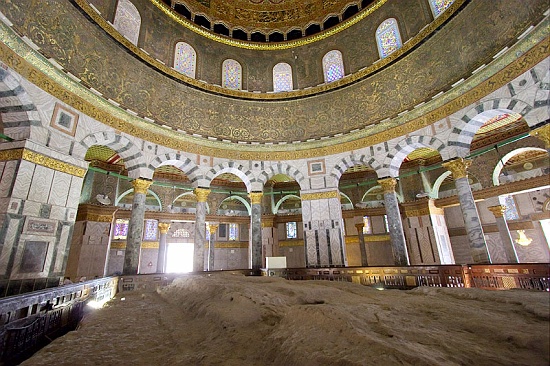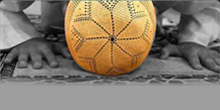The Prophet Sulaiman (A S) (Solomon) was the youngest son of the Prophet Dawud (A S). He was born at Jerusalem. As he was a talented fellow with versatile gifts, his father made him his heir. After the death of Prophet Dawud (A S) he ascended the throne of Judia on account of his sagacity, power of judgement, right understanding and spiritual insight.
Qur’an says: “And We verily gave knowledge to Dawud and Sulaiman and they said: praise be to Allaah Who has preferred us above many of his believing sons”. (27: I5)
Sulaiman (A S)’s Knowledge
Sulaiman (A S) inherited Dawud (A S)’s prophethood and dominion. This was not a material inheritance, as prophets do not bequeath their property. It is given away to the poor and needy, not to their relatives. Prophet Muhammad (SAW) said: ‘The prophets’ property will not be inherited, and whatever we leave is to be used for charity.”
And indeed We gave knowledge to Dawud (A S) and Sulaiman (A S), and they both said: ‘All the praises and thanks be to Allaah, Who has preferred us above many of His believing slaves!”
And Sulaiman (A S) inherited (the knowledge of) Dawud (A S). He said: “O mankind! We have been taught the language of birds, and on us have been bestowed all things. This, verily, is an evident grace (from Allaah).”
And there were gathered before Sulaiman (A S) his hosts of jinns and men, and birds, and they were all set in battle order (marching forwards). Surah 27: 15-17
♔ Sulaiman (A S) Becomes King
After his father’s death, Sulaiman (A S) became king. He begged Allaah for a kingdom such as none after him would have, and Allaah granted his wish. Besides wisdom, Allaah had blessed Sulaiman (A S) with many abilities. He could command the winds and understand and talk to birds and animals. Allaah directed him to teach both men and jinns to mine the earth and extract its minerals to make tools and weapons. He also favored him with a mine of copper, which was a rare metal in those days.
♔ Sulaiman (A S) Admiration of Horses
During his time horses were the common mode of transportation. They were very essential for defense, to carry soldiers and cart provisions and weapons of war. The animals were well cared for and well trained. One day Sulaiman (A S) was reviewing a parade of his stable. The fitness, beauty and posture of the horses fascinated him so much that he kept on stroking and admiring them. The sun was nearly setting, and the time for the middle prayer was passing by. When he realized this, he exclaimed: “I surely love the finer things of life than the service of my Lord! Return them to me.”
Qur’an Says:
So, We subjected to him the wind, it blew gently to his order whither-so-ever he willed – and also the devils from the jinns (including) every kind of builder and diver, – and also others bound in fetters. (Saying of Allaah to Sulaiman (A S)): ‘This is Our gift, so spend you or withhold, no account will be asked.” And verily, he enjoyed a near access to Us, and a good final return (Paradise)
[Surah 38: 30-40]
Sulaiman (A S) Hears the Ant’s Warning
One day Sulaiman (A S) gathered his army, which had different battalions of men, jinns, birds, and animals. He marched them to the country of Askalon.
While they were passing through a valley, an ant saw the approaching army and cried out to warn the other ants: “Run to your homes! Otherwise, unaware, Sulaiman (A S) and his army might crush you!” Sulaiman (A S), hearing the cry of the ant, smiled. He was glad that the ant knew him to be a prophet who would not intentionally harm Allaah’s creation. He thanked Allaah for saving the ants’ lives.
Sulaiman (A S)’s Travels
In Jerusalem, on a huge rock, Sulaiman (A S) built a beautiful temple to draw the people to worship Allaah. Today this building is known as ‘The Dome of the Rock.” From there, a large band of followers joined Sulaiman (A S) on pilgrimage to the Holy Mosque in Mecca. After they had completed their hajj, they traveled to Yemen and arrived in the city of Sana.
Sulaiman (A S) was impressed by their clever method of channeling water all over their cities. He was keen to build similar water systems in his own country but did not have enough springs.
The Hoopoe Brings Information to Sulaiman (A S)
He set out to find the hoopoe bird, which could detect water under the ground. He sent signals all over for the hoopoe to call on him, but it was nowhere to be found. In anger, he declared that unless the bird had good reason for its absence, he would punish it severely.
The hoopoe eventually came to Sulaiman (A S) and explained the reason for its delay: “I have discovered something of which you are not aware. I have come from Saba (Sheba) with important news. Sulaiman (A S) became curious, and his anger subsided. The bird continued: “Saba is ruled by a queen named Bilqis (Bilkis), who has plenty of everything, including a splendid throne. But in spite of all this wealth, Satan has entered her heart and the hearts of her people. She rules their minds completely. I was shocked to learn that they worship the sun instead of Allaah the Almighty.”
To check the hoopoe’s information, Sulaiman (A S) sent a letter to the queen with the bird. He instructed the bird to remain hidden and to watch everything.
The Queen of Saba (Sheba) Sends Gifts
The hoopoe dropped the letter in front of the queen and flew away to hide. She excitedly opened and read it: “Verily! It is from Sulaiman (A S), and verily! It (reads): ‘In the Name of Allaah, the Most Beneficent, the Most Merciful; be you not exalted against me, but come to me as Muslims (true believers who submit to Allaah with full submission).” Surah 27: 30-31
The queen was very disturbed and hurriedly summoned her advisors. They reacted as to a challenge, for they felt that there was someone challenging them, hinting at war and defeat, and asking them to submit to his conditions.
They told her that they could only offer advice, but it was her right to command action. She sensed that they wanted to meet Sulaiman (A S)’s invasion threat with a battle. However, she told them: “Peace and friendship are better and wiser; war only brings humiliation, enslaves people, and destroys the good things. I have decided to send gifts to Sulaiman (A S), selected from our most precious treasure. The courtiers who will deliver the gifts will also have an opportunity to learn about Sulaiman (A S) and his military might.”
Sulaiman (A S) Rejects the Queen’s Gifts
Sulaiman (A S)’s reconnaissance team brought him the news of the arrival of Bilqis’s messengers with a gift. He immediately realized that the queen had sent her men on a probing mission; thus, he gave orders to rally the army. The envoys of Bilqis, entering amidst the well-equipped army, realized that their wealth was nothing in comparison to that of the kingdom of Sulaiman (A S). They belittled their golden gift as they passed over Sulaiman (A S)’s palace floors, which were made of sandalwood and inlaid with gold.
They noticed Sulaiman (A S) surveying his army, and they were surprised at the number and variety of soldiers, which included lions, tigers, and birds. The messengers stood in amazement, realizing that they were in front of an irresistible army.
The envoys marveled at the splendor surrounding them. They eagerly presented their queen’s precious gifts and told Sulaiman (A S) that the queen wished that he would accept them as an act of friendship. They were shocked by his reaction: he did not even ask to open the covers of the containers! He told them: “Allaah has given me plenty of wealth, a large kingdom, and prophethood. I am, therefore, beyond bribery. My only objective is to spread the belief in Tawheed, the Oneness of Allaah.”
He also directed them to take back the gifts to the queen and to tell her that if she did not stop her kind of worship he would uproot her kingdom and drive its people out of the land.
The Queen Decides to Visit Sulaiman (A S)
The queen’s envoys returned with the gifts and delivered the message. They also told her of the wonderful things they had seen. Instead of taking offense, she decided to visit Sulaiman (A S). Accompanied by her royal officials and servants, she left Saba (Sheba), sending a messenger ahead to inform Sulaiman (A S) that she was on her way to meet him.
Sulaiman (A S) asked the jinns in his employ whether anyone among them could bring her throne to the palace before she arrived. One of them said: “I will bring it to you before this sitting is over.” Sulaiman (A S) did not react to this offer; it appeared that he was waiting for a faster means. The jinns competed with each other to please him. One of them named Ifrit said: “I will fetch it for you in the twinkling of an eye!”
No sooner had this one – who had the knowledge of the Book – finished his phrase than the throne stood before Sulaiman (A S). The mission had, indeed, been completed in the blinking of an eye. Sulaiman (A S)’s seat was in Palestine, and the throne of Bilqis had been in Yemen, two thousand miles away. This was a great miracle performed by one of those sitting with Sulaiman (A S).
The Queen’s Visit with Sulaiman (A S)
When Bilqis arrived at Sulaiman (A S)’s palace, she was welcomed with pomp and ceremony. Then, pointing to the altered throne, Sulaiman (A S) asked her whether her throne looked like that one. She looked at it again and again. In her mind she was convinced that her throne could not possibly be the one she was looking at, as hers was in her palace; yet, she detected a striking similarity and replied: “It is as if it were the very one, and resembles mine in every respect.” Sulaiman (A S) judged that she was intelligent and diplomatic.
He then invited her into the great hail, the floor of which was laid in glass and shimmering. Thinking it was water, as she stepped on the floor, she lifted her skirt slightly above her heels, for fear of wetting it. Sulaiman (A S) pointed out to her that it was made of solid glass.
She was amazed. She had never seen such things before. Bilqis realized that she was in the company of a very knowledgeable person who was not only a ruler of a great kingdom but a messenger of Allaah, as well. She repented, gave up sun worship, accepted the faith of Allaah, and asked her people to do the same.
It was finished; Bilqis saw her people’s creed fall apart before Sulaiman (A S). She realized that the sun which her people worshipped was nothing but one of Allaah’s creatures.
The sun eclipsed within her for the first time, and her heart was lit by a never-fading light, the light of Islam.
Jinns and Sulaiman (A S)
Sulaiman (A S)’s public work was largely carried out by the jinns. This was a punishment for their sins of making people believe that they were all powerful, knew the unseen, and could foresee the future. As a prophet, it was Sulaiman (A S)’s duty to remove such false beliefs from his followers.
Sulaiman (A S)’s Death
Sulaiman (A S) lived amidst glory, and all creatures were subjected to him. Then Allaah the Exalted ordained for him to die. His life and death were full of wonders and miracles; thus, his death harmonized with his life and glory. His death, like his life, was unique. The people had to learn that the future is known neither by the jinns nor by the prophets, but by Allaah alone. Sulaiman (A S)’s effort in this direction did not end with his life, for even his death became an example.
He was sitting holding his staff, overseeing the jinns at work in a mine. He died sitting in this position. For a long time no one was aware of his death, for he was seen sitting erect. The jinns continued with their strife and toil, thinking that Sulaiman (A S) was watching over them.
Many days later, a hungry ant began nibbling Sulaiman (A S)’s staff. It continued to do so, eating the lower part of the staff, until it fell out of Sulaiman (A S)’s hand, and his great body fell to the ground. People hurried to him, realizing that he had died a long time ago and that the jinns did not perceive the unseen, for had the jinns known the unseen, they would not have kept working, thinking that Sulaiman (A S) was alive.
Allaah says in Qur’an:
Allaah the Exalted revealed: And We caused a fount of (molten) brass to flow for him, and there were jinns that worked in front of him by the Leave of his Lord, and whosoever of them turned aside from Our Command, We shall cause him to taste of the torment of the blazing Fire. They worked for him what he desired, (making) high rooms, images, basins as large as reservoirs, and (making) cauldrons fixed (in their places). ‘Work you, 0 family of Dawud (A S), with thanks!” But few of My slaves are grateful.
Then when we decreed death for him (Sulaiman (A S)), nothing informed them (jinns) of his death except a little worm of the earth, which kept (slowly) gnawing a way at his stick, so when he fell down, the jinns saw clearly that if they had known the unseen, they would not have stayed in the humiliating torment. Surah 34: 12-14
















